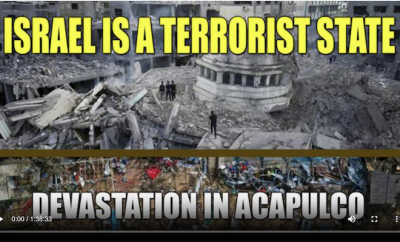 NEO.org
NEO.org
Featured
Armenian Genocide Remembered “4-All The Wrong Reasons”
by Seth Ferris, NEO.org:
On April 24 Armenia was holding various events to commemorate the 100th anniversary of the Armenian Genocide at the hands of the Ottoman Empire, which is conventionally held to have begun on that date in 1915. Though the term genocide is now in common currency, it was only coined, in 1943, as a means of describing these very events. It can therefore be said that our understanding of this term, and all subsequent uses of it, derives from the massive slaughter of the Armenians.
Unsurprisingly therefore Armenian Genocide commemorations are welcomed throughout the world. Around 20 individual countries, 43 US states and a number of European institutions recognise the events as genocide and some even prosecute people for denying it was such. Even contemporary Turkey commemorates what happened, though it does not agree that what took place was a systematic slaughter of the Armenian population simply for being Armenian.
However, despite this wide acceptance of the commemorations they remain highly politicised, much more so than, say, commemorations of those who died in the Second World War or were subject to other genocides, such as those perpetrated by the Khmer Rouge. As such, everything anyone does concerning the Armenian Genocide is subject to waves of claim, counter-claim and analysis, with all sides seeking to gain political capital out of events those few who survived would not wish to be reminded of. So why is this particular commemoration still arousing such passions a century on?
All things to all men
Recent events in Rome were typical of the international posturing which is accompanying these commemorations. Pope Francis convened a special Armenian Rite mass at St. Peter’s Basilica, despite the fact Armenians predominantly follow a native offshoot of Orthodoxy, and the national church has never been under Rome. With high-ranking Armenian clergy present, including the heads of the small Armenian Catholic Church which is in communion with Rome, the Holy Father referred to the Armenian Genocide as the first of the 20th century, a move calculated to antagonise Ankara, as it duly did.
Pope Francis also used the mass to formally bestow the title of Doctor of the Church on an 11th century Armenian mystic, St. Gregory of Narek, author of a prayerbook which is deeply venerated by Armenians. Only 36 individuals have been officially granted this title in the past two thousand years. It signifies that according to the Holy See they have contributed significantly to the Christian world. This act can either be read as either a recognition of a common heritage or a claim for territory, and an attempt to hijack the genocide for Rome’s own reasons, depending on one’s point of view.
Even reality TV star Kim Kardashian has been caught up in this. She has timed her first-ever trip to her ancestral homeland to coincide with the onset of the commemorations, and she and her family have been constantly hounded as they tour various sites and film shots to be used on the Kardashian TV show. Her husband, music star Kanye West, was moved to offer a surprise free concert in downtown Yerevan and ended it by jumping into the artificial pond around which it took place, causing an international sensation.
Though Ankara does not recognise the genocide it is too conscious of its growing importance in world affairs to boycott these commemorations, a move which would also risk grouping the country with fundamentalist Moslem states and organisations. It has therefore countered in a different way. For Turks 1915 doesn’t mean Armenian Genocide, it means Gallipoli, the First World War battle which saw the last glorious victory of the dying Ottoman Empire. This is usually celebrated on March 18. This year however it was celebrated on April 24, an irrelevant date as far as the battle is concerned, and it is obvious why.
Commemorations of most other historic events of 1915, if they are held at all, will not be accompanied by such jockeying for global favour, which does not in itself having anything to do with the genocide. This one casts a particular spell because it offers everyone who looks at it can gain two benefits, which are both as beguiling as a snake-charmer’s pipe.
For Armenians the Genocide, and Turkey’s ongoing denial of it, offer perpetual victimhood. This is used to add weight to all other claims, for territory, historical reparations and special treatment. Maybe we would not have the situation in Nagorno-Karabakh today if it had not been for the Armenian Genocide.
For Turks it offers a chance to achieve national impunity. The narrative is, “the Ottomans couldn’t really have done it because they were our ancestors, but we got rid of them anyway so it’s nothing to do with us”. For others it offers both these things at the same time – “We commemorate this dreadful event to show we don’t believe in genocide, as fellow victims, and therefore you can’t blame us for anything”.
Every country has dark chapters in its history, which identifying with someone else’s victims, rather than its own, can conveniently bury. For example, innocuous Belgium would rather talk about the Armenian Genocide than its much more recent treatment of its subjects in the Belgian Congo, and universally friendly Canada doesn’t want people looking at its ongoing treatment of its indigenous population. This systematic slaughter will continue to be commemorated as long as it gives everyone status, and the victims can be told that for this reason they did not die in vain.
Claiming the same gold
Some countries do not make as much of Armenian Genocide commemorations as some, without in any way minimising the suffering, injustice and significance of it. But they make sure the international fuss is reported, as it serves to highlight the fact that these countries have different concerns. The attitude of such countries is, “You are all commemorating this, and it is right that you should, but we have our own issue, shouldn’t you be addressing this too?”
The Gallipoli campaign has a special resonance for Australians and New Zealanders, as in popular opinion it was mostly ANZAC rather than British troops which were sacrificed during it. Every March 18 groups of antipodean exiles or travellers hosts a screening of the 1981 Australian film Gallipoli, the one which launched Mel Gibson as an international star.
The film depicts the Australian officers in a bad light, but most audiences assume these officers are British due to their upper-class accents. The film also states that all those young Australians were being sent to their deaths so that the British could get ashore at Suvla, but they had already come ashore without facing the enemy and were “sitting on the beach drinking cups of tea”, although this is not historically accurate.
It is easy to see why Australian and New Zealand audiences still respond to such portrayals, and why their countries regard the Armenian Genocide as a means of promoting their own causes in this way. No doubt the revulsion at what happened to the Armenians is genuine, but it is commemorated as much for Australia and New Zealand’s issues as the event itself.
Other countries in Armenia’s region will also be using the event to press their own claims, as everyone else seems to see it as a political free-for-all. Very little is known in the West about the vast numbers of troops removed from the Western Front to Russia at the height of the First World War to try and restore the Tsarist regime. Even less is known about the 1918 proxy war between the British and French, First World War allies, over the control of Lori, Javakheti and Borchalo districts, which had been part of the Tiflis Governorate of Russian Empire.
On December 5 1918, the newly independent Armenia, with French support, sent troops to occupy the Borchalo and Akalkhalaki districts, which were now part of the independent Republic of Georgia. The main advancing forces were eventually halted, but Tbilisi itself almost fell. Ultimately the Georgian army, with British support, mounted a counteroffensive, winning a battle at Shulaveri on 29 December and forcing an Armenian retreat.
Hostilities ended at the village of Sadakhlo on the night of 31 December, when the parties agreed to a British-brokered ceasefire. The disputed territory became a neutral zone, but was later divided between the Armenian SSR and the Georgian SSR. So in practice both sides lost, and neither has forgotten. With Georgia still facing longstanding Armenian claims to the part now in Georgia, and afraid to build a road across it because it might lead to Armenia annexing it, Georgia is sure to revive its own claims to the territory it lost if Armenia uses the Genocide to bolster these claims further.
Bloody Mary is a cocktail
Genocide is still with us, of course. Any responsible nation wants to be involved in world affairs and have its voice heard. Unfortunately there are any number of conflicts going on at present which give every country a means of improving its own credentials without actually doing anything about the conflict or their victims.
This past August pictures emerged from the Sinjar region of northern Iraq of Yezidis being deported and massacred by the self-proclaimed Islamic State. The irony of this tragedy was not lost on any Armenian, and more than once images of the two genocides were set side-by-side and seemed eerily similar. The only difference between the pictures from the Armenian Genocide and that of the Yezidis was that one was in black and white and the other in colour.
Turkey, which denies the Genocide, is known to be involved in both Iraq and Syria. The ethnic Armenian town of Kessab, just across the Turkish border with Syria, was invaded from the Turkish side in March 2014. Although the invaders were classified as terrorists, this could only have been done with the knowledge and assistance of the Turkish government, and subsequent revelations have confirmed this.
When such crimes are committed Armenians like to quote Hitler’s Obersalzberg speech of August 22, 1939
“I have sent to the East only my “Death’s Head units” with the order to kill without pity or mercy all men, women, and children of the Polish race or language. Only in such a way will we win the vital space that we need. Who still talks nowadays of the extermination of the Armenians?”
So Armenia has no problem interesting the world in commemorating its genocide. But it is less interested in the ultimate purpose of such commemorations. Will anyone actually learn anything from the fate of the Armenians? Doesn’t everyone have too much to gain from this hideous slaughter, which violates every moral canon, to take any real steps to prevent it happening again?
The commemorations once again deflected attention from a few hard facts. The fact that the West is supplying the Islamic State all the time it condemns it, and its victims are just collateral damage. The fact that what is described as the “global interest” or the “Western interest” is actually the personal interest of the US, pursued regardless of the human or economic costs to its friends as well as its enemies.
The fact that none of this needs to happen, as there is sufficient force and funding in the West to stop all this overnight, which it would use if it believed in its own values. The fact that none of those slaughtered by the Ottoman Empire, if they could be asked, would support world leaders treating the commemoration of their deaths as a means to gain the supposed moral authority everyone claims before doing the same again. Today a vast array of world leaders, including Armenia’s, are desperate to gain the most profit from something they say they condemn.

















